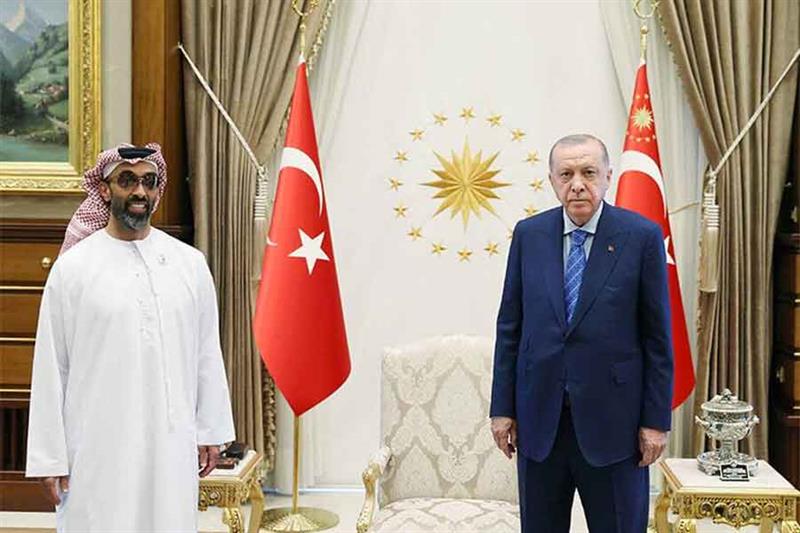
Turkish President Tayyip Erdogan meets with UAE national security adviser Sheikh Tahnoun bin Zayed Al Nahyan in Ankara, Turkey
UAE-Turkish relations, which have been sour for years, began to improve a few weeks ago. A few days before the visit, the Qatari foreign minister visited Abu Dhabi for the first time since the Qatar crisis in 2017.
Earlier this month, Saudi Foreign Minister Prince Faisal Bin Farhan Al Saud confirmed the first round of talks between the Saudis and the new Iranian government, saying the latest round had taken place on 21 September.
Talks between Riyadh and Tehran started in April in the Iraqi capital Baghdad, but were never officially confirmed by the Saudis.
An EU delegation visited Tehran this week trying to secure a commitment from Iran’s new hardline administration to resume negotiations over reviving a teetering nuclear deal from which the Americans withdrew in 2018. Nothing tangible came out of the visit, except Iran’s commitment to meeting with EU officials in Brussels in the next few weeks to discuss the details of texts on the table at the end of the last round of talks in June, which took place in Vienna.
It seems that with the end of the summer holiday season in the Gulf weeks ago, diplomatic efforts intensified on all fronts. Gulf-Iran relations are the centre of such efforts, though the situation pans a vast area from the US to Turkey.
“Negotiations without borders”, as one analyst described them, are happening against a backdrop of escalating tension in hot spots like Lebanon and Yemen. Turkey also is threatening to step up its military operations in the parts it occupies of Syria while in Iraq the results of general elections came in favour of Iran-allied political factions.
A Dubai-based Gulf analyst played down the flurry of negotiations in an interview with Al-Ahram Weekly, nonetheless noting the significance of escalating violence in Lebanon and Yemen that might be an indication of serious compromises between Iran and its neighbours with “every party playing its cards in the hot spots”. But he emphasised that the strategic goals of Gulf countries are “the same as they have always been: no normalisation with Iran until its actions prove that Tehran has abandoned its aggressive policies and stopped meddling in our internal affairs. As for Turkey, relations with it depend on its policies in the region and stopping any support for the Muslim Brotherhood.” When it comes to the US, though he admits the Biden administration has priorities other than the Middle East, no party in the region can afford risking alienating Washington.
A seasoned Western commentator with close ties to the region told Al- Ahram Weekly that the current round of multiple meetings and various dialogues might not yield much. He feels the Iranians are not willing to concede much to reach a compromise, whether with the Americans or their Gulf neighbours.
“As for nuclear negotiations with the US and the EU, the Iranian position seems to be based on the notion that ‘you can’t impose all your conditions on us. This is what a conqueror does to the defeated. We haven’t been defeated in the war of sanctions or maximum pressure’. Whether Tehran’s perception is right or not, this is the situation now.”
That in turn emboldens Iranian proxy groups in Iraq, Lebanon and Yemen. Those groups are an important bargaining chip in Iran’s hands when dealing with its Gulf neighbours. It might not be that significant in negotiations to bring the Americans back to the nuclear deal, but for the Iranians every little step helps.
Some in the Gulf are wary of the American indifference towards their real concerns about Iran. They are not content with lip service from Washington to the effect that Iran must stop interfering in its Arab neighbours’ internal affairs. They are well aware that actual Iranian-American negotiations are focused mainly on the nuclear deal. A similar sentiment is shared by the Israelis. That is why in the last few days both the Saudi and Emirati foreign ministers were meeting with officials in Washington.
Israeli commentator Zvi Bar’el wrote in the daily Haaretz, “The Tehran-Riyadh detente could mark the end of Israel’s anti-Iran coalition… If the talks between Iran and Saudi Arabia ended in reconciliation, the rest of the Arab world could swiftly follow suit. The Middle East would look like a very different place – and so would Israel’s place within it.”
It is not clear if negotiations will maintain the necessary momentum to make this autumn a season of reconciliation in a tense region. But as the Gulf analyst stated, it at least “makes the point of conflict more localised” and prevents its spread. Unfortunately there is no guarantee that any of these flaring struggles will not spill over the region in a dangerous way. Hopes are modest anyway that this coming winter should cool these “localised” fires. It all depends on the prospects of Iranian-American relations, and whether they will effect change in relations between Iran and the Gulf.
*A version of this article appears in print in the 21 October, 2021 edition of Al-Ahram Weekly
Short link: